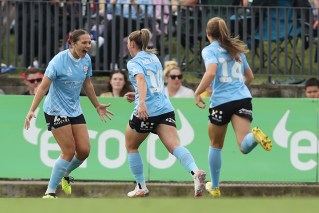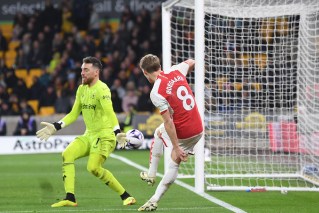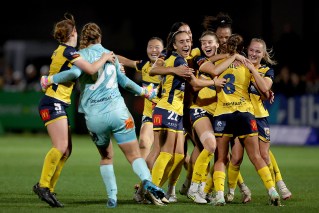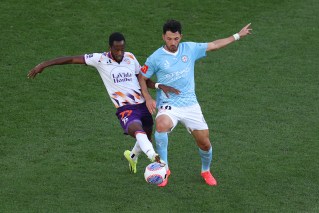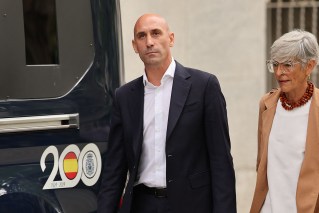Leicester City’s success is no fairytale story


Getty
Leicester City have done it.
The 5000-1 outsiders with the budget playing list and idiosyncratic manager are English Premier League champions.
In a football age when the free market rules and the rich get richer, this seems a victory for the little people.
• From chumps to champs: Adelaide United’s stunning A-League story
• This 127kg Aussie is the ‘talk of the town’ in the United States
• The horrific abuse suffered by female sports reporters
As one commentator quipped, there was more chance of finding Elvis Presley alive than Leicester winning the title.
It’s an unfashionable club from an equally unfashionable city.
But let’s get a few things straight.
According to Deloitte, Leicester is the world’s 24th-richest football club. It’s no Chelsea, Manchester United or Manchester City. It’s not even a West Ham United.
Leicester is bigger and richer than widely reported.
And what they have done is play the moneyball game better than its more cashed-up competitors.

Something fans have got used to: Jamie Vardy celebrating. Photo: Getty
While the big clubs headhunted at the top end of the player market, Leicester sought value for money.
It snared striker Jamie Vardy for £1 million from non-league outfit Fleetwood Town in 2012.
Algerian international Riyad Mahrez was lured from Le Havre in 2014 for a reported bargain price of £560,000.
The two were the driving force behind Leicester’s shock upset title.
There were also bigger signings; Japanese forward Shinji Okazaki was said to have cost £7 million, and midfielder N’Golo Kante was no bargain either – at £5.6 million.
The club’s best signing was manager Claudio Ranieri, though.
No team has had less possession, absorbed more pressure in its own half, yet counter-attacked so effectively as Leicester. His game plan has worked a treat.
The story off the pitch
But it’s off the pitch that you find the real reasons for the club’s success, and it’s not all positive.
The club is owned by the Thai-based Asian Football Investments, which is part of the duty-free retailer, King Power International Group.
Headed by Vichai Srivaddhanaprabha, King Power bought Leicester in August 2010 after previously being the team’s shirt sponsor.
In 2011, Srivaddhanaprabha took over as chairman with his son Aiyawatt as his deputy. Vichai promptly signed off on the club’s £103 million debt, converting it into shares.
With a net worth of $2.6 billion, according to Forbes, Srivaddhanaprabha also has heavy investments in polo.
He is a past president of London’s socially select Ham Polo Club, where he rubs shoulders with royals Charles and William.
In 2014 he established his own polo team, the King Power Foxes.
On a budget of £8 million, Srivaddhanaprabha stocked his stable with the finest horse flesh and riders money could buy, and the Foxes won the prestigious Gold and Queens’ cups at their first attempts.
Srivaddhanaprabha commutes from London for Leicester’s home matches, with his helicopter landing in the centre circle at King Power Stadium shortly after the final whistle.
Financial fair play
Despite topping the table, questions remain about the way in which Leicester has achieved success under Srivaddhanaprabha.
The club is currently under investigation for alleged breaches of the League’s financial fair play (FFP) regulations.
The allegations stem from the sale of the club’s marketing rights to the Sheffield-based Trestellar Ltd in January 2014.

Leicester’s owners commute via helicopter. Photo: Getty
Owned by David Richards Jnr., the son of the former head of the English FA, Trestellar held the rights to market the club throughout the UK and Southeast Asia.
As The Guardian uncovered, Leicester’s 2014-15 accounts reveal that Trestellar on-sold the rights to the club’s owners, King Power, which already held the shirt and stadium naming rights.
The deal allegedly came after David Richards Snr had been in discussions with the club on how to comply with FFP regulations.
At the time of the sale, Leicester was facing losses of £34 million, far in excess of the permitted £8 million under FFP rules.
The Trestellar deal reduced Leicester’s debt by £11 million and the chances of a hefty penalty under FFP rules.
But the question remains of whether Leicester gained an unfair advantage.
While other clubs reduced their player wage bill to comply with FFP rules, Leicester spent £36 million on player contracts, far in excess of the club’s total income.
Leicester’s books will be back in the black before long.
The club pockets around £90 million for its win and will get a sizeable slice of the £1.7 billion from broadcasting rights.
It will play in next season’s lucrative UEFA Champions League, but will be hard pressed to compete with the top European clubs, or go back-to-back in the league.
So savour the story for a moment longer, but also spare a thought for the real heroes, Leicester’s creative accountants, who took on the big boys at moneyball and won.
Tom Heenan teaches sports studies at Monash University.




